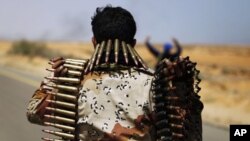The African Union (AU) will host several members of the international Libya contact group Thursday, with the goal of establishing a mechanism to enforce a ceasefire once the fighting ends. The ceasefire talks showcase the AU's struggle to remain relevant as it pursues a Libya policy at cross-purposes with the majority of the international community.
Thursday’s meeting at AU headquarters is seen as technical. Unlike the high-powered ministerial gathering in London on Monday, this meeting will attract mostly Addis Ababa-based representatives of the European Union, the United Nations, the Organization of Islamic Conference and the Arab League for talks on a Libya ceasefire mechanism.
With pictures of Tomahawk missiles and burning battle tanks flashing across television screens, it is hard to guess when, or if, talk of ceasefire monitoring might move up the agenda. But such is the African Union’s quandary as it tries to keep up the appearance of cooperating with the international community while accepting the reality that Moammar Gadhafi’s Libya is among its most forceful members.
Africa’s dilemma is exemplified by AU opposition to military action against Libya, even as all three African members of the United Nations Security Council voted for the resolution authorizing such action. The African Union was conspicuous by its absence at the London Conference this week, as it was at the Paris conference earlier in the month.
In a telephone interview, AU spokesman Noureddine Mezni said Africa’s views have been given scant attention as the international community pushes ahead with its military action against pro-Gadhafi forces.
"AU does not support any external military intervention in Libya. Consistent with this position, [Chairman Ping] did not attend the Paris conference which preceded commencement of air strikes, and even on this Paris conference we have been ignored. Nobody came from EU or the organizer, the French government to ask and talk to us while they send envoys to Cairo to meet the Arab League secretary general," said the spokesman.
In an attempt to establish itself as a mediator, the AU Peace and Security Council drew up what it called a "road map for peace in Libya." It includes appointment of a panel of five heads of state and AU Commission Chairman Jean Ping to open a dialogue between the warring parties.
But the panel, and its chairman, Mauritanian President Mohamed Ould Abdelaziz, were seen as close to Gadhafi. Its members were prohibited from travelling to Libya when the no-fly zone was imposed. Spokesman Mezni says the panel still hopes to work with coalition partners to take on the role of peacemaker.
"The chairperson is planning to go very soon in [the] coming days to meet partners to remind them it is very important, vital to travel to Libya to talk to the two parties to obtain an immediate ceasefire. Because without it we cannot talk about dialogue, and our road map was subject to consensus of the very countries at London conference," he said.
But in light of statements at the London conference calling for Gadhafi to leave, AU diplomats are wondering if their road map, and talk of dialogue and monitoring a ceasefire are still relevant. One senior AU official this week said, “It is important to complete what we are proposing." But he acknowledged that the effort appears to be going nowhere.
Libya Ceasefire Contingency Talks Highlight AU Dilemma




